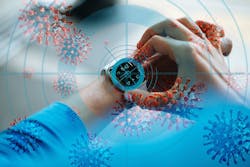Wearable devices can identify COVID-19 cases earlier than traditional diagnostic methods and can help track and improve management of the disease, suggests research from Mount Sinai as reported in a news release.
The findings were published in the Journal of Medical Internet Research.
The Warrior Watch Study found that subtle changes in a participant’s heart rate variability (HRV) measured by an Apple Watch signaled the onset of COVID-19 up to seven days before the individual was diagnosed with the infection via nasal swab. It also to identified those who have symptoms.
The researchers enrolled several hundred healthcare workers throughout the Mount Sinai Health System in an ongoing digital study between April and September 2020. The participants wore Apple Watches and answered daily questions through a customized app. Changes in their HRV – a measure of nervous system function detected by the wearable device – were used to identify and predict whether the workers were infected with COVID-19 or had symptoms. Other daily symptoms that were collected included fever or chills, tiredness or weakness, body aches, dry cough, sneezing, runny nose, diarrhea, sore throat, headache, shortness of breath, loss of smell or taste, and itchy eyes.
Additionally, the researchers found that 7 to 14 days after diagnosis with COVID-19, the HRV pattern began to normalize and was no longer statistically different from the patterns of those who were not infected.
The Warrior Watch Study draws on the collaborative effort of the Hasso Plattner Institute for Digital Health and the MSCIC, which represents a diverse group of data scientists, engineers, clinical physicians, and researchers across the Mount Sinai Health System who joined together in the spring of 2020 to combat COVID-19. The study will next take a closer look at biometrics including HRV, sleep disruption, and physical activity to better understand which health care workers are at risk of the psychological effects of the pandemic.

